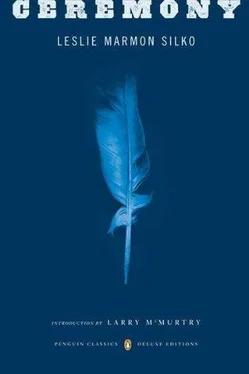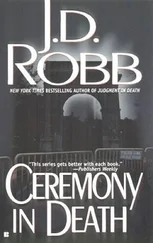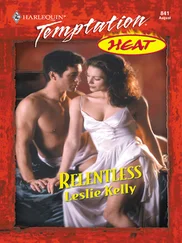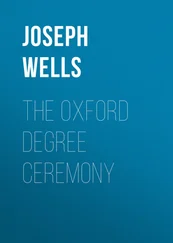The wind was blowing harder, and the mare’s long tail streamed around them like tall dune grass; the corral gate bumped back and forth in the wind. The mare was thirsty; she sank her nostrils under water and came up only to breathe. He rubbed her behind the ears where the bridle made sweaty creases in the hair. He smelled leather wet with horse sweat, and damp clay from the edge of the pool where the mare stood knee-deep; he smelled winter coming in the wind.
He tied the horse in the corral and pulled off the saddle. He untied his bedroll from the back of the saddle and looked for a sandy sheltered place to unroll his bed. The wind and sand were blowing so hard he didn’t hear her walk up from behind. He turned and she was there.
“Come inside,” she said loud enough to be heard over the wind. She pulled the handwoven blanket up around her shoulders and head, and walked into the stinging sand with her head bowed. He followed her with his head down and his eyes squeezed shut against the sand; but he did not miss the designs woven across the blanket in four colors: patterns of storm clouds in white and gray; black lightning scattered through brown wind.
He followed her down the long screen porch to a narrow pine door. When she opened it, he smelled dried apricots and juniper wood burning. The inner walls were massive and all the doorways were low. The smell of clay and mountain sage stirred old memories. He touched a whitewashed wall as he went through a doorway, and rubbed the powdery clay between his fingers. His heart was beating fast, and his hands were damp with sweat.
The fireplace was in the corner of the room; the flames blazed up, snapping the kindling and sucking at the wind that came down the chimney. He stood in front of the fire and held out his hands to get warm.
“Sit down. Eat.”
He took off his jacket and laid it on the bench beside him. He watched her move lids and pots on the small cookstove. She put a bowl and spoon in front of him. The chili was thick, red like fresh blood, and full of dried corn and fresh venison. She stood by the window and looked outside.
“The sky is clear. You can see the stars tonight.” She spoke without turning around. He felt a chill bristle across his neck, and it was difficult to swallow the mouthful of stew.
He had watched the sky every night, looking for the pattern of stars the old man drew on the ground that night. Late in September he saw them in the north.
He had left Laguna before dawn and drove all day until he came to the big arroyo where years of summer rain had gradually
 eroded the clay bank away from the narrow plank bridge, cutting a deep new channel between the road and the bridge.
eroded the clay bank away from the narrow plank bridge, cutting a deep new channel between the road and the bridge.
He got up from the table and walked back through the rooms. He pushed the porch screen door wide open and looked up at the sky: Old Betonie’s stars were there.
So they flew
all the way up again.
They went to a place in the West
(See, these things were complicated. . )
They called outside his house
“You downstairs, how are things?”
“Okay,” he said, “come down.”
They went down inside.
“Maybe you want something?”
“Yes. We need tobacco.”
Caterpillar spread out
dry corn husks on the floor.
He rubbed his hands together
and tobacco fell into the corn husks.
Then he folded up the husks
and gave the tobacco to them.
He watched her face, and her eyes never shifted; they were with him while she moved out of her clothes and while she slipped his jeans down his legs, stroking his thighs. She unbuttoned his shirt, and all he was aware of was the heat of his own breathing and the warmth radiating from his belly, pulsing between his legs. He was afraid of being lost, so he repeated trail marks to himself: this is my mouth tasting the salt of her brown breasts; this is my voice calling out to her. He eased himself deeper within her and felt the warmth close around him like river sand, softly giving way under foot, then closing firmly around the ankle in cloudy warm water. But he did not get lost, and he smiled at her as she held his hips and pulled him closer. He let the motion carry him, and he could feel the momentum within, at first almost imperceptible, gathering in his belly. When it came, it was the edge of a steep riverbank crumbling under the downpour until suddenly it all broke loose and collapsed into itself.
He rearranged the goat hides under the blankets and rolled over on his back. Under his leg he could feel the damp wide leaf pattern that had soaked into the blanket where she lay.
He dreamed about the cattle that night. It was a continuous dream that was not interrupted even when she reached out for him again and pulled him on top of her. He went on dreaming while he moved inside her, and when he heard her whisper, he saw them scatter over the crest of a round bare hill, running away from him, scattering out around him like ripples in still water.
She got up before dawn. When she left, he got dressed and followed her. The air felt damp and cold like the ground after the snow has melted into it, making it dense and rich. He stood on the steps and looked at the morning stars in the west. He breathed deeply, and each breath had a distinct smell of snow from the north, of ponderosa pine on the rimrock above; finally he smelled horses from the direction of the corral, and he smiled. Being alive was all right then: he had not breathed like that for a long time.
He walked to the corral and untied the mare. He led her to the tall grass around the pool and held the reins while she grazed, watching how she took great mouthfuls, working the bit with her tongue so that it didn’t interfere with chewing the grass. He squatted down by the pool and watched the dawn spreading across the sky like yellow wings. The mare jingled the steel shanks of the bit with her grazing, and he remembered the sound of the bells in late November, when the air carried the jingling like snowflakes in the wind. Before dawn, southeast of the village, the bells would announce their approach, the sound shimmering across the sand hills, followed by the clacking of turtle-shell rattles — all these sounds gathering with the dawn. Coming closer to the river, faintly at first, faint as the pale yellow light emerging across the southeast horizon, the sounds gathered intensity from the swelling colors of dawn. And at the moment the sun came over the edge of the horizon, they suddenly appeared on the riverbank, the Ka’t’sina approaching the river crossing.
He stood up. He knew the people had a song for the sunrise.
Sunrise!
We come at sunrise
to greet you.
We call you
at sunrise.
Father of the clouds
you are beautiful
at sunrise.
Sunrise!
He repeated the words as he remembered them, not sure if they were the right ones, but feeling they were right, feeling the instant of the dawn was an event which in a single moment gathered all things together — the last stars, the mountaintops, the clouds, and the winds — celebrating this coming. The power of each day spilled over the hills in great silence. Sunrise. He ended the prayer with “sunrise” because he knew the Dawn people began and ended all their words with “sunrise.”
The horse had stopped grazing and was standing still; whether she had eaten all the grass she could reach and was waiting for him to move her, or whether she had paused the way the mule deer stop grazing at dawn, he did not know. Maybe the dawn woke the instinct in the dim memory of the blood when horses had been as wild as the deer and at sunrise went into the trees and thickets to hide.
Читать дальше

 eroded the clay bank away from the narrow plank bridge, cutting a deep new channel between the road and the bridge.
eroded the clay bank away from the narrow plank bridge, cutting a deep new channel between the road and the bridge.










